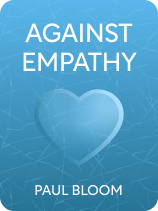

This article is an excerpt from the Shortform book guide to "Against Empathy" by Paul Bloom. Shortform has the world's best summaries and analyses of books you should be reading.
Like this article? Sign up for a free trial here.
What should be the basis for how you behave? Why isn’t empathy the best guide?
If we want to be kind and moral people, it seems obvious that we should practice empathy. But, psychologist Paul Bloom suggests that we should cultivate a rational form of compassion instead and use this more measured and distanced approach to make decisions that are better for everyone involved.
Continue reading to learn about Bloom’s concept of rational compassion.
Rational Compassion
In deconstructing how empathy affects our decisions and leads to less-than-ideal outcomes, Bloom proposes an alternative to empathy: rational compassion. We’ll explore how Bloom describes rational compassion and argues that it gives us the capacity to behave more reasonably than we do when guided by empathy.
(Shortform note: In his review of Against Empathy, psychologist Kenneth Barish offers an alternative interpretation of the research that Bloom cites when he draws a distinction between empathy and compassion. According to Barish, that research doesn’t support the idea that compassion and empathy are two separate psychological processes; instead, the research suggests that feeling empathic distress or feeling compassion are two different courses that we might take after we initially feel empathy for a person.)
What Is Rational Compassion?
In arguing against making decisions using empathy, Bloom asserts that we should use a conscious, deliberate, reasoned, rational compassion to ensure that we act with care for others.
Though “rational compassion” might sound similar to “cognitive empathy”—which, as a reminder, involves understanding others’ experiences and does have a place in our interactions with others, according to Bloom—there’s a key difference between the two. While cognitive empathy involves understanding what another person is feeling, compassion is less about thinking through another person’s experience and more about caring about them and their welfare. Because compassion involves caring about other people and wanting them to be happy and thrive, it enables us to feel for others without taking on their feelings.
Bloom explains that, with rational compassion, we can bring our capacity for rational thinking to bear on moral problems. This form of compassion combines our capacity to care about other people with our ability to make detached, objective decisions. Intelligence, self-control, and concern for others are all key components of rational compassion, and these can all inform our decisions. For example, if your community is hit by a devastating storm, you might make a logical plan to distribute resources as widely as possible to the people affected, rather than focusing solely on people you know and with whom you naturally empathize.
(Shortform note: Various thinkers have suggested using rational thinking and compassionate feelings together. In Compassionate Reasoning, Marc Gopin argues for a form of reasoning guided by compassion. Gopin characterizes compassion as a crucial emotion in our interactions with others, one that we can apply to all people—and to all living beings, for that matter—in a way that enables sustainable care for everyone, regardless of whether they’re similar to or different from us. Gopin writes that the core of the shift from empathy to compassion is a shift away from personal distress and toward “a joyous embrace of and service to others.”)
Do We Have the Capacity for Reason?
Bloom anticipates one major reason why people might object to his suggestion to replace empathy with rational compassion: Some scholars suggest that our capacity for rational thinking isn’t strong enough (or dominant enough) to win out over more emotional influences. But, Bloom disagrees. He asserts that we can choose reason over emotion when we make moral decisions.
An enduring idea in psychology is that we have two cognitive systems that engage in very different kinds of thinking: emotional and rational. Bloom explains that according to some researchers, the rational system is often powerless to overrule the emotional system. We’re irrational in many ways: We use heuristics, or mental shortcuts, to make decisions, which sees us succumb to the influence of cognitive biases and ignore base rates in our probability estimates, making incorrect judgments and irrational decisions.
But, Bloom writes that, if these flaws in our decision-making make it clear that we’re irrational, our ability to overcome them illustrates how intelligent we can be despite our irrationality. He suggests that though our ability to engage in rational thinking isn’t enough on its own to make us good or moral people, rationality is a key part of morality. Ultimately, he concludes that we all have the capacity to behave rationally and make better decisions.
| Are Humans Rational or Irrational? Bloom’s argument that we can choose to make decisions based on reason rather than emotion touches on a perennial debate about human nature. We often behave irrationally, but does that mean we’re fundamentally irrational? Justin E. H. Smith, author of Irrationality, argues that irrationality is inherent to human life. Smith contends that it doesn’t work when we try to suppress our irrational sides. But he writes that many of the good things in life come from that side of our nature, and it doesn’t serve us to overemphasize either the rational or the irrational parts of our thinking. Another perspective comes from psychologist Daniel Kahneman, who writes in Thinking, Fast and Slow that even though we believe that we behave rationally, we actually make many of our decisions subconsciously and only later use rational thinking to justify them. While Bloom writes about an emotional system and a rational system, Kahneman talks about a fast, automatic system and a slow, deliberate system. The fact that the automatic system is faster than the deliberate system leaves us vulnerable to making mistakes and relying on cognitive biases when we make decisions. That said, overcoming our cognitive biases and exercising our more rational side isn’t necessarily a matter of intelligence, as Bloom suggests: Some experts argue that intelligence and rationality are distinct. Kahneman and his collaborator Amos Tversky demonstrated that even highly intelligent people are prone to irrational thinking and that rationality correlates only weakly with IQ. |

———End of Preview———
Like what you just read? Read the rest of the world's best book summary and analysis of Paul Bloom's "Against Empathy" at Shortform.
Here's what you'll find in our full Against Empathy summary:
- How the conventional understanding of empathy gets it wrong
- How empathy can motivate us to act in unjust, irrational, and cruel ways
- Why we should practice rational compassion instead of empathy






